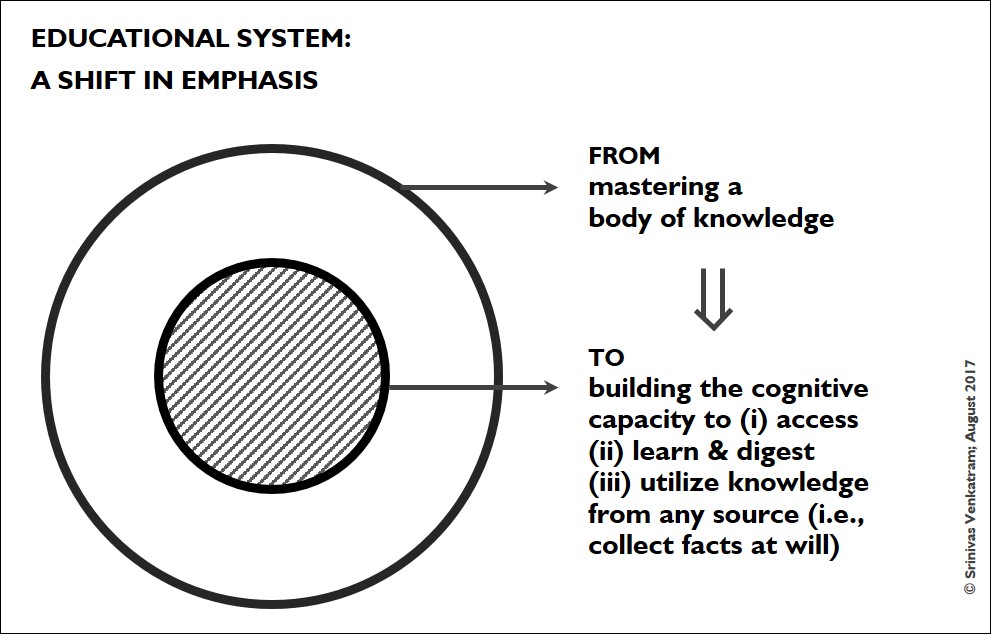To me the very essence of education is concentration of mind, not the collecting of facts. If I had to do my education over again, and had any voice in the matter, I would not study facts at all. I would develop the power of concentration and detachment, and then with a perfect instrument I could collect facts at will.
– Swami Vivekananda
CW: Vol.6, Lectures and Discourses, Concentration and breathing
In this quote, Swami Vivekananda proposes a
shift in the way we think about education.
Thus far, education, in so far as knowledge
goes, has been organized around the transmission of information and concepts.
This model of education has been appropriate
for two main reasons:
One, there has been, and will always be, the necessity for the individuals to acquire a certain amount of information and knowledge in order to navigate through and engage with society. This is the “socialization imperative” that is crucial if you need to ensure that learnings/ knowledge get transmitted across generations.
Thus, a basic knowledge of science, for example, allows a society to perpetuate a rational temper and an ability to sense-make the environment based on mankind’s current and latest understanding of how the world works.
Two, there is a need for individuals to develop a certain set of skills or a body or knowledge and methods, which allow them to carry out several specialized activities in the context of society. This is the “specialization imperative” that is necessary for development of a total societal capability – that includes all kinds of professions (doctors, engineers, scientists, teachers, etc.) in various domains to ensure that society functions to the best of its collective ability.
Both these drivers – the socialization imperative and the specialization imperative demand the organized transfer of concepts and information to various groups of people in society, at different stages of their individual and collective development.
Both these imperatives continue to be valid – and as society becomes more complex and sophisticated, their importance only grows.
This is the “why?” of the transmission of knowledge.
Swami Vivekananda does not discuss the ‘why?’ in this quote. Rather, he questions the “how?” of this transmission of knowledge.
To appreciate the importance of this “how?” question, let us look at the world around us.
In today’s environment, thanks to the Internet and the information-access revolution,
(i) information and concepts on any
subject is easily available to almost anyone,
(ii) students/ individuals from all over the world have access to some of the best teachers elsewhere in the world
(iii) the presentational methods of information and knowledge are evolving rapidly.
Furthermore,
(i) the various domains of
knowledge are themselves evolving rapidly
(ii) the increasing complexity of the environment is forcing professionals to reach out across domains and specializations to find answers,
These trends imply that
(i) the importance of knowledge/
information transmission through a traditional classroom is going down
(ii) the importance of giving individuals the ability to expand, evolve, and refine their own knowledge, by learning/ seeking knowledge on their own is going up.
This means, that the objective (or the “why?” of the educational system) is helping individuals become capable of
(i) not just ‘socialization’, but “continual socialization” in an ever-changing world, (i.e., the ability to stay abreast and sensemake an ever-changing world), and
(ii) not just ‘specialization’, but “evolutionary specialization” as domains become more complex (i.e., the ability to evolve skills and knowledge as the domains in which we operate, themselves evolve)
If we must address the imperatives of ‘continual socialization’ and ‘evolutionary specialization’ in society, the key question is: Is the transmission of information and concepts, and the awarding of certification/ degrees, based on the mastery of this information/ concepts the best way to achieve/ realize these imperatives?
Swami Vivekananda proposed, presciently – more than a 100 years ago – that, we focus not so much on mastery of facts, but on the cognitive capacity to collect facts
in our education system.
This ‘cognitive capacity’ for collecting facts at will enables us to address the challenges of ‘continual socialization’, and ‘evolutionary specialization’. It is this cognitive capacity which needs to be primarily transmitted through our education system.

What is
the nature of this cognitive capacity?
The cognitive capacity derives, according to
Swami Vivekananda, from two abilities
(i) the ability to concentrate and
focus attention (i.e., dive deep into a subject), and
(ii) the power of detachment, i.e., be able to avoid getting attached to a single perspective or set of skills that we may be comfortable with, and cut across domains and subjects (i.e., expand our scope of interests and thinking).
This dual capacity of ‘diving deep into a subject’ and ‘expanding our scope of interest and thinking’ is the cognitive capacity that will be needed by society as it grapples with the new educational challenges (of preparing students for ‘continuing socialization’ and ‘evolutionary specialization’).
It is this capacity that Swami Vivekananda
points out to us, in this prescient prescription for the education system.
------------
Author: Srinivas Venkatram is the founder of Illumine – an “ideas in action” Lab that focuses on translating Swami Vivekananda’s ideas into new social, institutional and educational models. Illumine’s projects and interventions have reached more than 2 million users/ beneficiaries in society.
On this channel, Srinivas offers an interpretation of Vivekananda’s ideas, through the lens of Citizenship and Nation-building. For more, visit the Reflections on The Lion’s Roar.